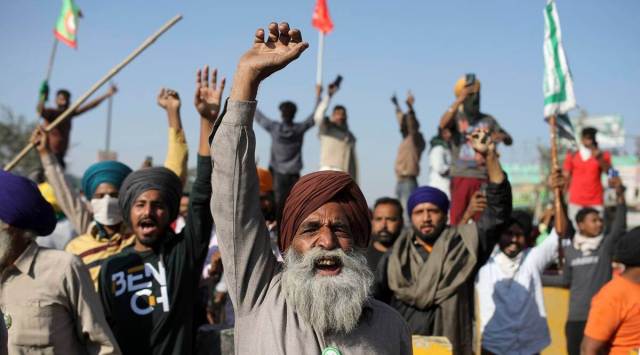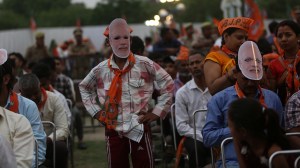- India
- International
Let the farmers lead
Movement against agricultural laws has posed a direct challenge to privatisation and its champions.
 Protesting farmers at Singhu border. (AP photo)
Protesting farmers at Singhu border. (AP photo)Each system has its underlying dynamics, which aid in its preservation and perpetuation. In India, the advancement of the neo-liberal/finance capitalist system through privatisation/corporatisation is no exception. Since 1991, this system has been at the heart of the country’s policies in open defiance of the constitutional system. During the last three decades, most “national” enterprises have become increasingly oriented towards strengthening this system. But despite the dominance of neoliberal ideology, especially in the initial decades of its introduction, there was strong opposition as well. Against the threat of neo-imperialist slavery, the need for an idea of alternative politics and, simultaneously, the need for a political organisation was also strongly underlined. But the opposition/alternative collapsed as, along with global circumstances/factors, the hidden supporters of the neoliberal system united with its open supporters who were in large numbers. This unity of the open and hidden supporters came to the forefront in the “anti-corruption movement” organised under the aegis of India Against Corruption (IAC).
In the absence of a genuine and sustainable opposition to this system in mainstream politics and intellectual discourse in the last 15-20 years, the finance capitalist system has developed its own independent dynamics. As a result, every roll of the dice falls in its favour. The handful of political organisations and individuals who are genuinely opposed to this system continue to remain marginalised. The unbridled horse of the capitalist Ashwamedh is galloping, plundering national resources/assets/labour, amalgamating public sector enterprises/institutions in the unabated pursuit of profits. Constitutional democratic institutions are being dragged behind this horse, losing their strength and structure.
This phenomenon is not limited to the economic plight of the majority of the population and the super prosperity of a small section on their cost. In almost all dimensions, our national life is becoming hypocritical, false, mischievous, superstitious and quarrelsome. It is needless to reiterate that the neoliberalist/finance capitalist system is the opposite of the constitutional sovereignty we achieved along with Independence and the now badly-maligned constitutional socialism. The ruling class is fully aware of this. It incessantly churns out slogans like ‘Shining India’, ‘Sabka Vikas’ ‘Achchhe Din’, ‘New India’, ‘Vishwaguru Bharat’ and stokes ultra-nationalism to cover up the open betrayal of the values of the freedom movement and Constitution.
There is one strong group in the country of those which considers itself different and “above it all” from all this. But the authenticity of this enlightened section is doubtful when seen against reality. It can be said that the country’s present predicament is a result of the dubiousness of this section.
Against this backdrop, the farmers’ movement against the three new agricultural laws seems to have grabbed the reins of the horse of capitalism. The movement has ideological clarity, is persistent in its demands and opposed to privatisation-corporatisation. This is evident from the statements of the leaders of any farmer organisation or farmers/farm-labourers involved in the movement. The movement is democratic, with the participation of peasant organisations with different ideological and political views. The restraint, discipline and decency of the agitators and leaders, despite the unfavourable conditions and the extremely hostile atmosphere, create confidence that the largest segment in India has not lost its wisdom and conscience.

Even though the movement against agrarian laws was taken up mainly by the farmers of Punjab, Haryana, western Uttar Pradesh and to a lesser extent Rajasthan, it has attained an all-India character. Women and children of farmers’ families are also participating in the movement, fighting against the severe cold days and nights, in the terrible shadow of the pandemic. The movement has received active support and cooperation at the national and international level, from citizens associated with administration, business, sports, arts etc.
Punjab has set an example. The movement has broken all the stereotypes prevalent about the state — from “drug-addicted Punjab” to “separatist Punjab”. Children, youth and the elderly are reaching Delhi’s borders by tractors, tempos, buses, cars, three-wheelers, two-wheelers to be a part of the movement. That too without creating any ruckus on the way or at the protest site. I was travelling on the road from Chandigarh to Delhi on January 3. In a small tempo, three children — two boys aged between 8 and 11 and a girl aged about 14 — were travelling to Delhi to join the dharna with their family. To protect the children, ropes were firmly tied at the rear of the tempo. Those pastoral children sitting behind the ropes network were going to Delhi to free their farming from corporatisation!
We cannot and should not expect that a peasant movement raises the flag against privatisation-corporatisation outside the agricultural sector. The agricultural sector is larger than all other sectors. Corporate houses are not oblivious of the potential of its tremendous profits. That is why they had their eye on the sector since the beginning of liberalisation. In the first phase of liberalisation, several lakh farmers committed suicide. The ruling classes were not deterred at by those suicides. Another round of farmer suicides could come due to the new agricultural laws. The ruling class will not care about that either. Four farmers have committed suicide at picketing sites during the present agitation.
In the wake of this movement, it is hoped that citizens from various fields supporting it will move beyond moral support towards understanding the implications of corporate-friendly policies. The boycott of some of Ambani-Adani’s products may be strategically correct, but linking it to the boycott of the marketist-consumerist sub-culture will spread consciousness about the movement. It would be better if activist supporters of the movement coming from peoples’ movements and civil society leave the movement to peasants only. They should not call for it to be a platform for freedom from fascism-Brahminism and Sanghwad (the ideology of the RSS). Farmers should let all sides/parties, including the Supreme Court, understand that these laws are not only against the constitutional federal structure but also the basic spirit of the Constitution. If the debate is focused on the subject related to the movement, it will get greater cross-sectional support. Farmers should be allowed to compete on their own against the government-corporate policy.
The farmers of Punjab had made it clear at the outset that they had come to Delhi prepared for a long struggle and were committed to a peaceful movement. They are conducting negotiations with the government and are organising various programmes to exert pressure on the government. On January 7, they held a rehearsal to take out the tractor parade in Delhi on Republic Day. If the struggle is to go on for long, then more programmes will be on their list. Farmer leader Rakesh Tikait has said that the movement will last till May 2024. Clearly, this statement has political implications.
Opposition parties/leaders should be asked to make a promise that they will not corporatise the agricultural sector when in power. When this happens, the present government will come under pressure, and the opposition will not be able to leverage the movement for political gains.
(The writer teaches Hindi at Delhi University)
EXPRESS OPINION
Apr 24: Latest News
- 01
- 02
- 03
- 04
- 05










































